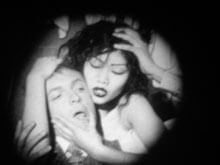Guy Maddin’s latest film cuts closest to autobiographical tales
With three film releases in the past two years, Guy Maddin has taken a step out of the obscurity he endured during the 1990s after his disastrous “Twilight Of The Ice Nymphs.” Earlier this year, he published “From The Atelier Tovar,” a collection of diary entries, news articles and screenplay treatments.
Judging from the films, it’s easy to imagine Maddin as an utter eccentric barricaded in a Winnipeg basement with a collection of rotting 16-mm prints of silent movies. On the written page, however, he presents himself as an ordinary guy who worries about his weight and love life, albeit one with a vast knowledge of cinema and literature. The book’s most remarkable piece of writing is a 46-page treatment, “The Child Without Qualities.”
Casting himself as a passive observer of family melodrama and tragedy, the treatment is the most straightforward piece in the collection and the first piece of film work Maddin set during his own lifetime. “The Child Without Qualities” was never expanded into a full script, but Cowards Bend The Knee” revises the feelings and ideas behind it. Told in ten chapters, with intertitles and sound effects but no dialogue, “Cowards Bend The Knee” opens with a hockey team, the Winnipeg Maroons, winning a game.
One of their players, Guy Maddin (Darcy Fehr), finds out that his girlfriend Veronica (Amy Stewart) is pregnant. They go to the BlackSilhouette, a beauty salon/bordello/abortion clinic. During Veronica’s abortion, Guy becomes enraptured by Meta (Melissa Dionisio) and walks out with her, leaving Veronica to fend for herself. However, Meta has a different agenda. She wants Guy to avenge her father’s murder using his severed blue hands.
“Cowards Bend The Knee” picks up where Maddin’s Soviet silent-movie pastiche short “The Heart Of The World” left off. In addition to directing it, Maddin served as cameraman. As a cinematographer, he’s exactly the opposite of a craftsman like Vittorio Storaro. He likes degrading the image. “Cowards Bend The Knee” is designed to look like it could have been made in the 1920s. More importantly, it resembles a print from that time period.
The soundtrack is full of static, recalling the early 1990s hip-hop trend of sampling scratched records. The black-and-white image is grainy. The lighting fluctuates wildly, often being so bright that it obliterates the actors’ faces. The framing is eccentric and full of disorienting close-ups. Some montage sequences go by so quickly that they’re almost subliminal.
The subplot about severed hands comes from Robert Wiene’s 1924 German horror film “The Hands Of Orlac,” but the setting of “Cowards Bend The Knee” draws from real life. Maddin’s father Chas managed a Winnipeg hockey team in the 1960s. His mother Herdis ran a beauty parlor. He has taken these mundane facts and let his imagination run wild. The excitement running through the film derives as much from rewriting life in the style of Greek tragedy and Hollywood melodrama as Maddin’s usual joy in cinema as a toy set.
“Cowards Bend The Knee” is Maddin’s most sexually explicit film and, appropriately, it first came to life as a peephole installation at Toronto’s Power Plant gallery. With the Maroons stripping down in the locker room, it’s also his most homoerotic. Murder and sex with parental figures are a constant, unsettling preoccupation. Guy becomes terrified by his “out of control” limbs, but they merely give him an excuse to act out his subconscious urges, including murdering Meta’s stepfather in the middle of a hockey game. Both Maddin’s diaries and “The Child Without Qualities” are haunted by the death of Chas, who suffered a stroke at 59. In its own unconventional way, “Cowards Bend The Knee” exorcises some of this grief, but perhaps not in a manner that Maddin’s family would appreciate.
As always with Maddin, it’s difficult to tell where put-ons stop and start. He’s rumored to have invented some of the life story he’s written about and discussed in interviews. Is “Cowards Bend The Knee” a goof, or a serious attempt to penetrate the mystery of family life? I lean towards the latter.
In Maddin’s films, emotions often exist in quotation marks, filtered through irony and a plethora of movie references. “Sissy-Boy Slap-Party” and “Sombra Dolorosa,” the two Maddin shorts filling out Film Forum’s program (which also includes the Quay Brothers’ “The Phantom Museum”), help point up the merits of “Cowards Bend The Knee.” Pastiches of 1960s gay avant-garde cinema and Mexican melodrama, respectively, the two Maddin shorts have little resonance beyond camp value and a flair for mimicry.
Shot in five days, “Cowards Bend The Knee” is not exactly automatic writing—Maddin knows exactly which Greek tragedies he’s pillaging—but it feels like a direct flood from the unconscious. His most dreamlike film, it’s also his most heartfelt.



































